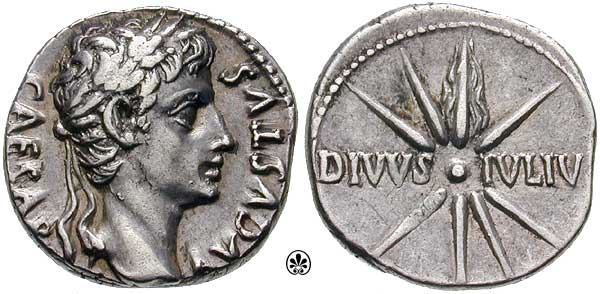“Civic Religion” is the term coined to describe a system of worship whose cult is rendered to a human ruler in the form of homage, tribute, loyalty and allegiance. Examples can be found in ancient Egypt, Greece and Rome. Romulus, considered the founder of Rome, was deified and worshipped as the deity Quirinus. Julius Caesar was the first roman living ruler to accept the title of “divine”, when a statue of himself was erected in the temple of Quirinus is 45 BC with an inscription: “To the invincible God”. When Julius Caesar died, he was elevated to the status of god in equal standing with the pantheon of roman gods (a process called ‘apotheosis’) and a cult to Jupiter Julius, complete with a temple was established. But it was with his successor, Octavian Augustus, that the imperial cult became fully established. After a string of catastrophes, Octavian brought peace, stability and prosperity to the romans, and such feat was considered so extraordinary that only a divine being could accomplish that. There was no way to explain a power so great without appeal to a divine nature residing within Augustus. As adopted son of the divine Julius Caesar, Augustus started by styling himself as “son of God”, and later accepted and actively promoted the construction of temples dedicated to the worship of himself as a divinity. Mandatory sacrifices to the genius of the emperor were made compulsory, and upon his death, on 14 AD, by an official decree from the roman senate, Octavian Augustus Caesar was included among the pantheon of roman gods, and received a temple and priests. For centuries to follow, the cult of the emperor, this form of “civic religion” thrived both in the city of Rome and in the roman provinces.
Coin with the deified effigy of Augustus, son of the deified Julius Caesar.
Status of deified emperor Octavian Augustus.
Temple to emperor Augustus in Nimes, France.
So, here’s my question: Was Octavian Augustus a fictional character or a real being? Since we all can agree that his existence was a verifiable fact, it is also an undeniable fact that he was considered a deity and received worship from humans and a religion, temples and a pristehood were established in his honor. Just as Yahweh or the deified Jesus Christ or Aura Mazda or any other deity that you can think of. Therefore, here is a deity that exists, or, at least, that existed at one point in time. And here is the problem with the atheist proposition: It requires a certain kind of deity to be feasible. Namely, it requires a spiritual, superhuman deity that claims special powers not commonly held by humans. This is the kind of deity that atheism claims that doesn’t exist. However, their proposition stumbles and hits a brick wall when a different kind of deity is being discussed. Deities DO exist, because what makes a deity is the willingness of human beings to worship said entity. Anything and anyone can be a deity just as long as anyone has some kind of rationale for establishing its cult.
The type of deity that atheists take such pride in debunking may or may not exist. But the proposition that “deities don’t exist” is plain simply a mystification . They can exist, even if, as Simon said, the possibility that they exist in the form that we expect them to exist is so hugely remote that we chose to embrace the notion that it may just as well be inexistent. However, because we haven’t made a research so wide as to scan the entire universe and all the known physical dimensions (not to mention those dimensions who aren’t known yet, but merely theorized that exist), no one can say with a 100% degree of absolute certainty that “no deities exist”. As per the example above, they do exist. Hence, I stand by the proposition that “The only thing that can be said about God is that it's absent”- absentheism.


